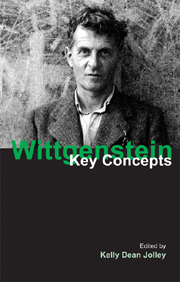Book contents
- Frontmatter
- Contents
- Contributors
- Abbreviations
- Introduction
- 1 Wittgenstein's philosophical remarks
- 2 Wittgenstein on meaning and meaning-blindness
- 3 Language-games and private language
- 4 Wittgenstein on family resemblance
- 5 Ordinary/everyday language
- 6 Wittgenstein on rule-following
- 7 Thinking and understanding
- 8 Psychologism and Philosophical Investigations
- 9 Moore's paradox revisited
- 10 Aspect perception
- 11 Knowing that the standard metre is one metre long
- 12 Therapy
- 13 Criteria
- 14 Grammatical investigations
- 15 Teaching and learning
- 16 Expression and avowal
- Chronology of Wittgenstein's life
- Bibliography
- Index
2 - Wittgenstein on meaning and meaning-blindness
- Frontmatter
- Contents
- Contributors
- Abbreviations
- Introduction
- 1 Wittgenstein's philosophical remarks
- 2 Wittgenstein on meaning and meaning-blindness
- 3 Language-games and private language
- 4 Wittgenstein on family resemblance
- 5 Ordinary/everyday language
- 6 Wittgenstein on rule-following
- 7 Thinking and understanding
- 8 Psychologism and Philosophical Investigations
- 9 Moore's paradox revisited
- 10 Aspect perception
- 11 Knowing that the standard metre is one metre long
- 12 Therapy
- 13 Criteria
- 14 Grammatical investigations
- 15 Teaching and learning
- 16 Expression and avowal
- Chronology of Wittgenstein's life
- Bibliography
- Index
Summary
Introduction
It is at least plausible to assert that Wittgenstein's philosophical legacy lies with his discussions of meaning in the Philosophical Investigations. It does not follow from this, of course, that these discussions are well understood. One often sees allusions to them in the form of a single phrase such as “Wittgenstein's definition of meaning as use” or “Wittgenstein's use-theory of meaning”. A typical citation is the following, from a text on philosophy of language: “In according the concept of truth pivotal status, we are moving beyond the original Wittgensteinian doctrine that equates meaning with use” (Collin & Guldmann 2005: 35). This is then taken to be Wittgenstein's contribution: his theory of meaning as use. The idea is that he has told us how our words come to mean what they do (namely, by our use of them). This way of understanding what Wittgenstein says is tempting but wrong, in my view. Such a reading fails to capture what is truly philosophically radical in his work.
In this chapter I shall exhibit some of the various things Wittgenstein has to say about meaning in the Investigations as well as what we are to take away from them. First, I shall examine the early part of the Investigations, §§1–43. I shall spend most of my time on this material, as I believe the main points to be laid out here. Second, I shall examine an often-overlooked part of the book, the mid-§§500s. Finally I shall turn to some relevant discussions in Part II of Investigations.
- Type
- Chapter
- Information
- WittgensteinKey Concepts, pp. 27 - 40Publisher: Acumen PublishingPrint publication year: 2010

